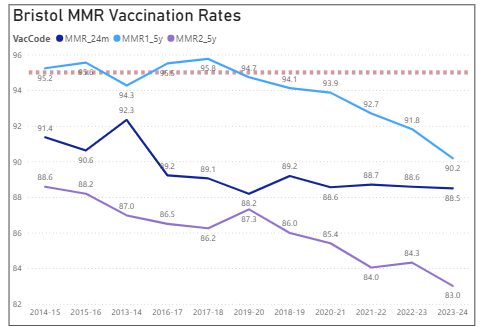I am declaring an MMR Vaccination Emergency

What are the MMR Vaccinations?
The MMR vaccine protects against 3 infections - measles, mumps and rubella. These are viral infections that can quickly spread to non-immune children and adults who have not had their vaccinations or been previously infected.
The first dose of MMR is currently offered to infants when they turn 1 and the second dose to pre-school children when they are around 3 years and 4 months old.
What data is being used?
The data in this article is sourced from NHS England.
MMR Vaccination Charts
These charts show the percentage of eligible children who have been vaccinated aged 12 months and 5 years.
These are the 3 measure used in the charts:
- MMR_24m - MMR 1st dose at age 24 months
- MMR1_5y - MMR 1st dose at age 5 years
- MMR2_5y - MMR 2nd dose at age 5 years
The target for Vaccination Rates is 95% and is shown as a dotted line on the charts.
MMR Vaccination Rates in Bristol
In Bristol the rate of First Dose MMR Vaccinations at 24 months has declined from 91.4% in 2014-15 to 88.5% in 2023-24.
The rate of First Dose Vaccinations at 5 years has fallen from a peak of 95.8% in 2017-18 to 90.2% in 2023-24.
The rate of Second Dose Vaccinations at 5 years has fallen from 88.6% in 2017-18 to 83% in 2023-24.

Why is this important?
Since the MMR vaccine was introduced in 1988, these conditions have become rare in the UK. However, outbreaks of disease, especially measles, have occurred when the number of people having the vaccine has dropped. The fall in MMR uptake over the last decade explains the rise in measles cases we have subsequently seen in the UK since 2023.
More than 1 in 10 eligible children under the age of 5 in England haven’t had the Measles Mumps and Rubella (MMR) vaccine or are only partially vaccinated.
This leaves these children unprotected and increases the risk of measles outbreaks occurring in nurseries and schools. We are reminding parents and guardians to ensure their children are protected by taking up 2 doses of the MMR vaccine at the right time.
Over the past decade, there has been a slow decline in the number of parents and carers getting their children vaccinated with the MMR and other childhood vaccines. Measles is highly contagious so even a small decline in MMR uptake can lead to a rise in cases.
How does Bristol compare with other areas?
The charts below show how Bristol compares with other local authorities in the region. Bristol has the lowest rates of MMR Vaccinations and these rates are also declining at a higher rate.


What about the rest of the Country?

Average Rates of MMR Vaccinations in 2023-24
In the UK, England has the lowest average rate of MMR Vaccinations.

The South West has the 2nd highest average rate of MMR vaccinations.

But in our local area, Bristol has the lowest average rate of MMR Vaccinations.

So What?
The risks of having low rates of MMR Vaccinations are clear. Bristol should recognise that MMR Vaccinations only protect us properly if the overall rates are high, (the target is 95%). This means we should consider the bigger picture and not just think that vaccinations are some kind of individual lifestyle choice.
There have been ridiculous scare stories about MMR Vaccines causing Autism. And some people have lost trust in vaccinations because of their experiences with COVID Vaccines.
See: Rise of vaccine distrust - why more of us are questioning jabs - BBC In Depth

Comments ()